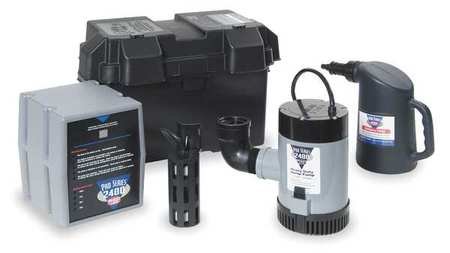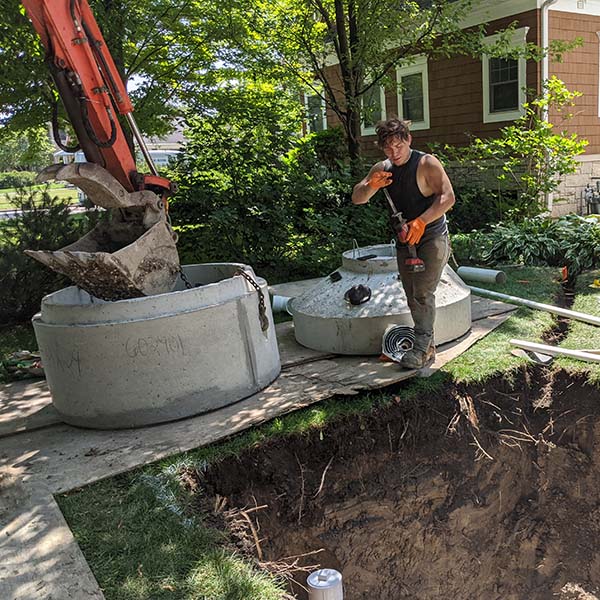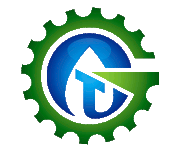Flood Prevention – Des Plaines, IL
Floods often strike unexpectedly and at the most inconvenient times. For instance, they can occur during a downpour when the power suddenly goes out. Flooding can occur due to various factors, including severe weather, clogged storm drains, malfunctioning sump pumps, or city mains causing sewage backups into homes. To make matters worse, most floods aren’t covered by standard homeowners insurance policies; they typically require a separate or additional policy for coverage. In the past, preventing basement floods was difficult, but thankfully, there are now both traditional and modern methods to help keep your property dry.
What Should You Do If Your Basement Floods?
Before worrying about property damage from a flood, it’s crucial to take several precautionary steps to ensure your safety. If the water level is high, avoid touching anything electrical unless you are standing on dry wood and wearing protective rubber-soled boots. This is especially important if the water has risen high enough to cover electrical outlets. If you need to leave the property due to an evacuation or another reason, it’s recommended to turn off your gas and electricity at the main shutoff points. Floodwater is often extremely dirty, especially if it involves sewage backing up into your home. Even after the water recedes, the floors may be left covered in debris, sewage, and mud, creating a potential slip-and-fall hazard. After the flood, it’s essential to thoroughly clean and sanitize everything the water has touched.
Green Tech Plumbing Co.
Your trusted flood prevention experts.
With decades of expertise in flood control and prevention, Green Tech Plumbing offers the most effective solutions to keep your home or business dry. Partner with us and enjoy peace of mind. Call us today at 847-518-5338 to get started!

Recently, a new type of thunderstorm has been impacting the local area. These sudden and intense isolated storms unleash inches of rain on neighborhoods in a short period, overwhelming the sewer system. When sewer mains become overloaded, the excess pressure forces wastewater back up through household drains. Aging infrastructure and an increasing population continue to worsen the issue over time.
Flood Control System Types
1.) Standpipes:
Standpipes are an old, tried-and-true method for managing sewer backups. They have been used for decades to control basement flooding caused by minor sewer overflows. A standpipe works by creating back pressure on the sewer system. The pipe extends just above floor level, allowing standing water to be pushed back down by gravity. However, water can still seep through cracks in the floor. For this reason, we typically don’t recommend this type of flood control system.
2.) Overhead Sewer
Overhead sewers are one of the most effective ways to protect your property from floods. Adding a battery backup system takes it to the next level. While no system is 100% failproof due to the moving parts in pumps and motors, combining an overhead sewer with a reliable battery backup makes your property nearly flood-proof.
With an overhead sewer system, lower-level fixtures are no longer connected directly to the city sewer. Instead, they drain into an ejector pump, which pushes the water into the overhead sewer lines. Our system integrates overhead sewer lines with a pump station, offering peace of mind whether you’re home or away. This solution is ideal for anyone dealing with frequent flooding, particularly when city sewer backups are an issue.
To ensure maximum protection, it’s important to keep your equipment and battery backup system well-maintained. We recommend scheduling annual maintenance and inspections to keep everything in top working order.
3. Lift Stations
Installing a flood control system, such as a lift station, is one of the most reliable ways to protect your home from flooding and sewage backups. With torrential downpours and increasingly unpredictable weather patterns, flooding problems have become more frequent in areas like Des Plaines and Park Ridge, IL. For example, during the spring of 2020, many residents experienced severe sewage backups and flooding.
Standard sewer systems rely on gravity to move water, but when the city sewer backs up, homes are at risk of flooding. A lift station solves this by placing a basin and pumps between your home and the city sewer. Instead of depending on gravity, the lift station uses commercial pumps to move water to a higher elevation, effectively channeling it into the sewer system. This method offers a powerful solution to protect your property, even during neighborhood-wide flooding.
What is a lift station?

Instead of draining directly into the sewer, your property’s wastewater flows into the lift station and is then pumped out. When city sewers become overwhelmed, the lift station’s catch basin acts as your personal sewer, protecting your home from sewage backups.
What Are the Drawbacks of Lift Stations?
Lift stations require little ongoing maintenance, but their electronic controls, valves, and pumps operate in tough conditions. While the structure itself is built to last a lifetime, key components typically need rebuilding every 15 to 20 years. Regular maintenance helps ensure long-term reliability.
Why Are Des Plaines & Park Ridge Flooding?
It Wasn’t This Bad Before.
Recently, a new type of thunderstorm has been affecting the area. These sudden, isolated storms dump inches of rain in a short period, overwhelming the sewer system. When sewer mains become overcharged, wastewater can back up through household drains. Aging infrastructure and population growth exacerbate the problem, making flooding more common over time.
Cook & DuPage County, Illinois
Our plumbers are very used to the challenges of the local infrastructure. When the suburbs of Chicago were built they never anticipated the volume of people that would be using the sewer systems. Des Plaines, Park Ridge, and the surrounding areas are prone to flooding because of it.
We are experts in water engineering, flood control, and plumbing and we are always pleased to discuss your options and the best solutions for your particular situation. Contact us online to get a free estimate on your flood control project.
Helpful Information
If you live in Des Plaines, be sure to explore the Flooding Rebate programs available on their official website. These programs can help offset the costs of implementing effective flood control measures for your home.

